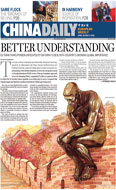Different impact of price hikes
Updated: 2011-04-15 11:24
By Lu Chang (China Daily European Weekly)
Local players to suffer but large Western firms see opportunities
Rising fuel prices will have a larger impact on local businesses as well as create merger and acquisition opportunities for Western multinationals, analysts say.
China's National Development and Reform Commission, the country's top economic planner, raised wholesale prices of gasoline by 500 yuan (53 euros) each ton, or an extra 0.37 yuan per liter, on April 7 amid record hikes in global oil prices.
Diesel prices were lifted by 400 yuan a ton or 0.34 yuan for each liter.
High fuel prices may have a direct negative effect on sectors such as public transportation, healthcare and consumer goods, but it may also prompt some multinational companies to step up business expansion by acquiring small Chinese companies and quickening the pace of industrial relocation.
Xu Xianglin, associate dean at the school of government in Peking University, says fuel price hikes always hit small domestic businesses the hardest, giving international players an opportunity to make acquisitions.
"For example, in the consumer goods sector, many small domestic companies don't have much of financial reserves to cover rapid increases in their cost of doing business," Xu says.
"Furthermore, they are always the last to get paid when their customers fall on hard times or have higher-than-expected bills."
However, international consumer products giants such as P&G and Unilever, can offset these by raising their prices because they have a stronger research and development as well as production cost control abilities, wringing concessions out of their smaller suppliers.
"Consequently, international players will find it easier to pass on price increases to their customers and small companies will be inclined to sell their businesses to large international groups to survive in the domestic market already worsened by the skyrocketing price of energy," Xu says.
"This will be a great excuse for most international companies to increase their retail prices," says Xu, adding that many Chinese will prefer world famous brands to domestic ones in the face of similar prices.
Although Unilever and P&G held back their plans to hike prices for their products after the government stepped in late last month, Xu says these companies may turn to alternative ways to mitigate costs.
Lu Jinyong, a professor of economics at the University of International Business and Economics, says that soaring energy prices have also helped trigger industrial relocation, prompting Western companies to shift their manufacturing bases to central and western China.
"Rising fuel prices are becoming another factor after labor cost, raw materials and environmental concerns to force Western companies to rethink where to build their manufacturing sites," Lu says.
He cited US computer maker Hewlett-Packard and US networking giant Cisco setting up manufacturing bases in the southwestern mega-city of Chongqing to cut the cost as examples.
China's traditional manufacturing bases such as Guangdong and Zhejiang provinces are becoming less advantaged than inland provinces and cities that offer improved transportation capacities and preferential policies.
Local government officials have also been luring foreign investment by offering companies free land to build new factories and low taxes as well as compensation for additional costs of transporting products to coastal ports, Lu says.
Keith Harrison, head of global supply at P&G, said in an interview with Financial Times that rising costs of production and operations are forcing the company to change.
"The environment has changed. Transportation cost is going to create an even more distributed sourcing network than we would have had otherwise," he says.
E-paper

Head on
Chinese household care goods producers eye big cities, once stronghold of multinational players
Carving out a spot
Back onto center stage
The Chinese recipe
Specials

British Royal Wedding
Full coverage of the royal wedding of Prince William and Kate Middleton in London. Best wishes

The final frontier
Xinjiang is a mysterious land of extremes that never falls to fascinate.

Bridging the gap
Tsinghua University attracts a cohort of foreign students wanting to come to China.
